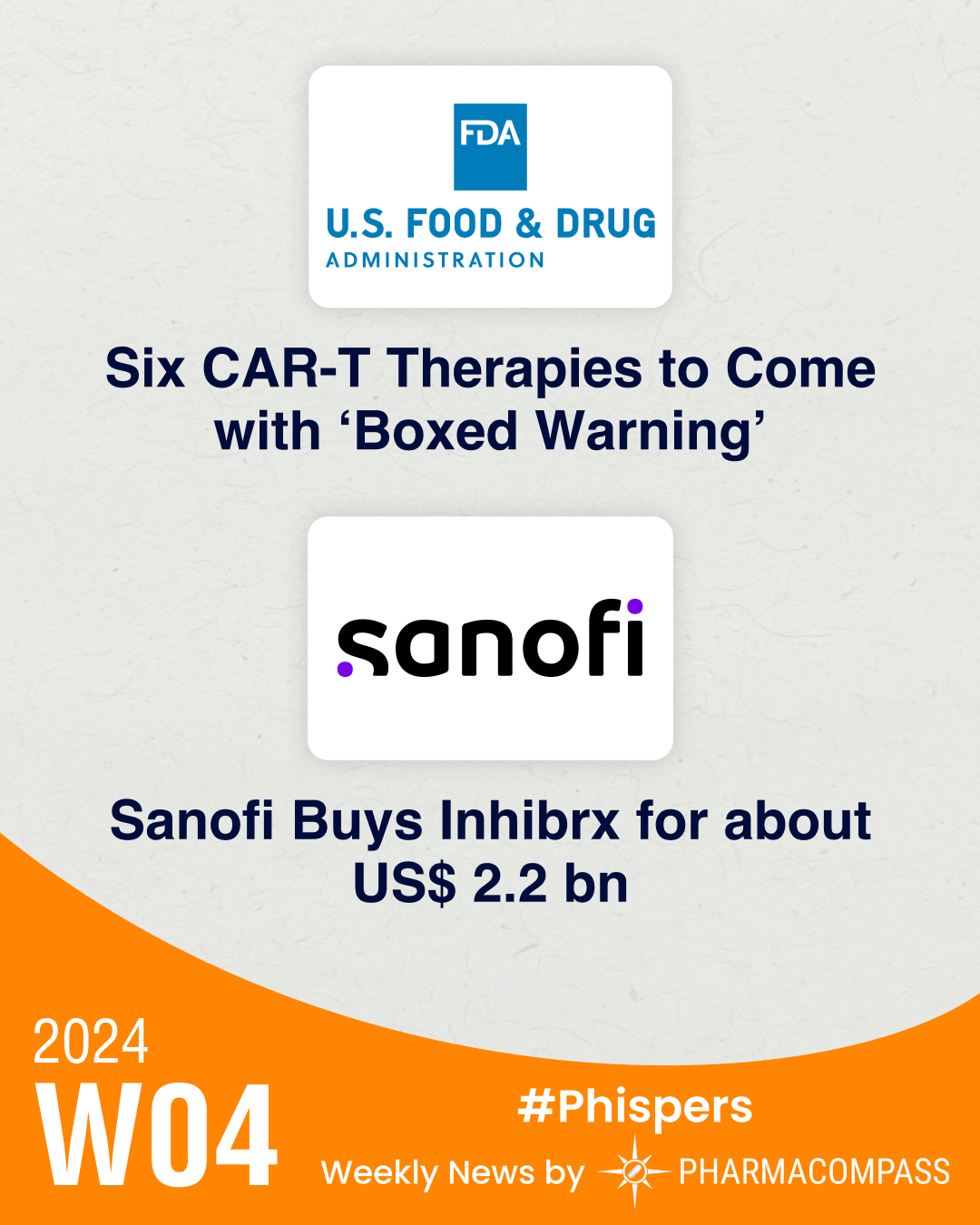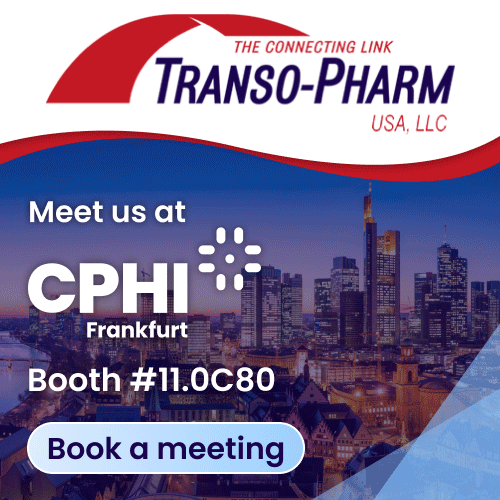
By PharmaCompass
2024-01-25
Impressions: 2,585 (Article) || 1 (Video)
The US Food and Drug Administration (FDA) has mandated “black box” warnings on six major CAR-T cancer therapies over the risk of developing secondary cancer.
Two experimental gene therapies that work on mutations of the OTOF gene reportedly cured profound deafness in young children.
The Biden Administration has urged the US Supreme Court to reverse an August 2023 ruling that curbs access to abortion pill mifepristone by barring telemedicine prescriptions and mail shipments of it.
Eli Lilly’s New Jersey plant is back in the news, as the FDA reportedly found “eight separate deficiencies” concerning manufacturing processes and quality controls.
Johnson & Johnson’s Stelara raked in over US$ 10 billion last year. Meanwhile, the drugmaker agreed to resolve talc probes in 42 states in the US through a tentative settlement of US$ 700 million.
In acquisitions, Sanofi forked out US$ 2.2 billion to buy Inhibrx, a clinical-stage biopharma, to gain access to its experimental treatment for a rare disease.
FDA mandates ‘boxed warning’ on six CAR-T therapies over secondary cancer risk
FDA has issued letters to six manufacturers of cancer therapies that use CAR-T technology to add a serious warning on their label (i.e. boxed warning), after the agency found a serious risk of developing secondary cancer associated with those therapies.
These therapies include Bristol-Myers Squibb’s Abecma and Breyanzi, Janssen Biotech’s Carvykti, Gilead’s Yescarta, Novartis’ Kymriah, and Kite Pharma’s Tecartus.
“Boxed warnings” or “black box warnings” are reserved for the highest safety warnings to bring attention to the major risks of a treatment.
Amgen’s osteoporosis drug to carry boxed warning: Amgen’s blockbuster drug Prolia to treat bone loss was also hit with a boxed warning requirement as it raises the risk of severe hypocalcemia (low calcium levels) in patients with advanced chronic kidney disease (CKD), especially those on dialysis.
Biden urges Supreme Court to undo curbs on major abortion pill
In June 2022, the US Supreme Court had ended its recognition of a constitutional right to abortion by overturning an earlier ruling (of 1973). And later that year, an umbrella group of anti-abortion doctors and activists in the US had claimed that the FDA had unlawfully approved Danco Laboratories’ mifepristone.
Now, the Biden Administration has urged the apex court to reverse an August 2023 ruling that curbs access to the pill by barring telemedicine prescriptions and mail shipments of it.
The apex court’s ruling in this case is expected by June-end, months before the November presidential elections.
The pill had been legal in the US since 2000. The two drug-regimen was approved for use in pregnancies of up to 10 weeks. A patient is first given mifepristone to induce an abortion, followed by misoprostol to empty the uterus. Over the last two decades, the FDA, the American College of Obstetrics and Gynaecologists (ACOG) and other mainstream medical bodies have maintained that both drugs are safe.
Since 2016, the FDA had further eased access to the drug by allowing doctors to meet patients via telemedicine, and issue prescriptions over email.
Lilly, Refreshgene’s gene therapies cure congenital deafness in clinical trials
The week brought some good news for those with congenital deafness. According to Reuters, an experimental gene therapy being developed by a Chinese company restored hearing in children with congenital deafness. Five of six young children with profound deafness experienced hearing recovery and improvements in speech recognition six months after being treated with the therapy from Refreshgene Therapeutics. All the children had profound deafness caused by mutations of the OTOF (otoferlin) gene.
In another early-to-mid-stage trial of Eli Lilly’s investigational gene therapy AK-OTOF, the hearing of an 11-year-old boy was restored. The boy was born deaf. The boy could hear within 30 days of a single administration of AK-OTOF.
After 2021 DOJ probe, fresh manufacturing, quality lapses found at Lilly’s NJ plant
Eli Lilly’s New Jersey plant, which was subject to a Department of Justice (DOJ) probe back in 2021, has now been found to have several manufacturing problems. According to a Reuters report, the FDA has detected “eight separate deficiencies” at the plant. The issues included problematic tracking of manufacturing processes and quality controls. There were also lapses in the calibration of equipment and the company failed to appropriately maintain facilities and equipment.
The Indianapolis-based drugmaker told Reuters the inspection took place in July, after it had asked FDA for “additional flexibility” in the manufacturing process for migraine treatment Emgality (galcanezumab-gnlm). Drugs manufactured at the facility include diabetes medicine Trulicity (dulaglutide), and cancer therapies Cyramza (ramucirumab) and Erbitux (cetuximab). Lilly has said safety, quality, and supply of current or planned products remain unaffected.
J&J to pay US$ 700 million to settle talc probe in 42 US states
Johnson & Johnson confirmed it has reached a tentative settlement of US$ 700 million to resolve probes by US states into whether it misled consumers about the safety of its talcum powder. The deal includes 42 states and Washington DC. The settlement does not extend to private plaintiffs’ cases against the company, some of which are expected to go to trial later this year.
Stelara crosses US$ 10 billion in 2023 sales: J&J’s blockbuster Stelara (ustekinumab) clocked sales of US$ 10.86 billion in 2023. The psoriasis drug’s sales are expected to drop 3 percent in 2024 to US$ 10.54 billion. The first biosimilar for the drug, Amgen’s Wezlana (ustekinumab-auub), is expected to be launched in 2025.
Sanofi buys rare disease drugmaker Inhibrx for about US$ 2.2 billion
Sanofi has agreed to buy California-based clinical-stage biopharmaceutical company Inhibrx for about US$ 2.2 billion. The acquisition is aimed at acquiring the biopharma’s mid-stage experimental treatment INBRX-101, which will bolster the French drugmaker’s rare genetic disease portfolio. Inhibrx’s other investigational drugs will be spun off into a different company, known as Inhibrx, in which Sanofi will hold an 8 percent stake. INBRX-101 is a potential treatment for Alpha-1 Antitrypsin Deficiency (AATD), a rare disease that causes the lung tissue to progressively deteriorate.
Meanwhile, there was news that the Walgreens Boots Alliance is looking into the possibility of selling its specialty pharmacy company Shields Health Solutions for over US$ 4 billion.
The PharmaCompass Newsletter – Sign Up, Stay Ahead
Feedback, help us to improve. Click here
Image Credit : Phisper Infographic by PharmaCompass license under CC BY 2.0
“ The article is based on the information available in public and which the author believes to be true. The author is not disseminating any information, which the author believes or knows, is confidential or in conflict with the privacy of any person. The views expressed or information supplied through this article is mere opinion and observation of the author. The author does not intend to defame, insult or, cause loss or damage to anyone, in any manner, through this article.”








